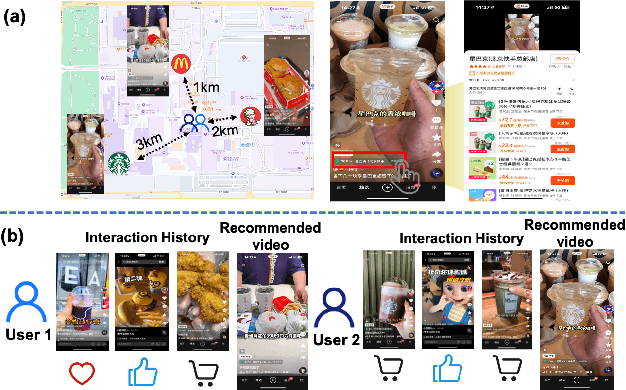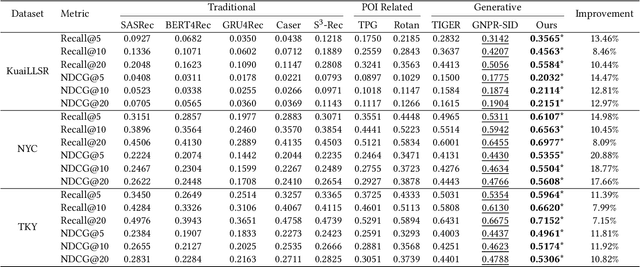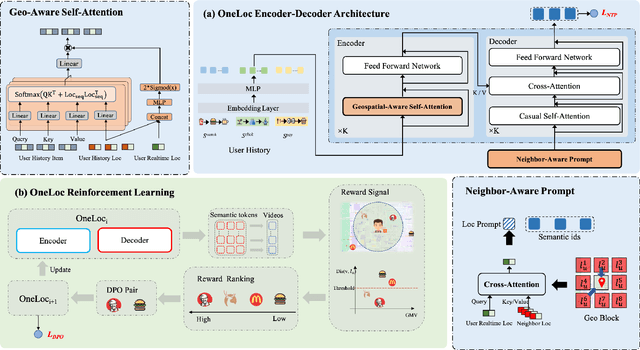Kuo Cai
GLASS: A Generative Recommender for Long-sequence Modeling via SID-Tier and Semantic Search
Feb 05, 2026Abstract:Leveraging long-term user behavioral patterns is a key trajectory for enhancing the accuracy of modern recommender systems. While generative recommender systems have emerged as a transformative paradigm, they face hurdles in effectively modeling extensive historical sequences. To address this challenge, we propose GLASS, a novel framework that integrates long-term user interests into the generative process via SID-Tier and Semantic Search. We first introduce SID-Tier, a module that maps long-term interactions into a unified interest vector to enhance the prediction of the initial SID token. Unlike traditional retrieval models that struggle with massive item spaces, SID-Tier leverages the compact nature of the semantic codebook to incorporate cross features between the user's long-term history and candidate semantic codes. Furthermore, we present semantic hard search, which utilizes generated coarse-grained semantic ID as dynamic keys to extract relevant historical behaviors, which are then fused via an adaptive gated fusion module to recalibrate the trajectory of subsequent fine-grained tokens. To address the inherent data sparsity in semantic hard search, we propose two strategies: semantic neighbor augmentation and codebook resizing. Extensive experiments on two large-scale real-world datasets, TAOBAO-MM and KuaiRec, demonstrate that GLASS outperforms state-of-the-art baselines, achieving significant gains in recommendation quality. Our codes are made publicly available to facilitate further research in generative recommendation.
ALPBench: A Benchmark for Attribution-level Long-term Personal Behavior Understanding
Feb 03, 2026Abstract:Recent advances in large language models have highlighted their potential for personalized recommendation, where accurately capturing user preferences remains a key challenge. Leveraging their strong reasoning and generalization capabilities, LLMs offer new opportunities for modeling long-term user behavior. To systematically evaluate this, we introduce ALPBench, a Benchmark for Attribution-level Long-term Personal Behavior Understanding. Unlike item-focused benchmarks, ALPBench predicts user-interested attribute combinations, enabling ground-truth evaluation even for newly introduced items. It models preferences from long-term historical behaviors rather than users' explicitly expressed requests, better reflecting enduring interests. User histories are represented as natural language sequences, allowing interpretable, reasoning-based personalization. ALPBench enables fine-grained evaluation of personalization by focusing on the prediction of attribute combinations task that remains highly challenging for current LLMs due to the need to capture complex interactions among multiple attributes and reason over long-term user behavior sequences.
OneMall: One Architecture, More Scenarios -- End-to-End Generative Recommender Family at Kuaishou E-Commerce
Feb 02, 2026Abstract:In the wave of generative recommendation, we present OneMall, an end-to-end generative recommendation framework tailored for e-commerce services at Kuaishou. Our OneMall systematically unifies the e-commerce's multiple item distribution scenarios, such as Product-card, short-video and live-streaming. Specifically, it comprises three key components, aligning the entire model training pipeline to the LLM's pre-training/post-training: (1) E-commerce Semantic Tokenizer: we provide a tokenizer solution that captures both real-world semantics and business-specific item relations across different scenarios; (2) Transformer-based Architecture: we largely utilize Transformer as our model backbone, e.g., employing Query-Former for long sequence compression, Cross-Attention for multi-behavior sequence fusion, and Sparse MoE for scalable auto-regressive generation; (3) Reinforcement Learning Pipeline: we further connect retrieval and ranking models via RL, enabling the ranking model to serve as a reward signal for end-to-end policy retrieval model optimization. Extensive experiments demonstrate that OneMall achieves consistent improvements across all e-commerce scenarios: +13.01\% GMV in product-card, +15.32\% Orders in Short-Video, and +2.78\% Orders in Live-Streaming. OneMall has been deployed, serving over 400 million daily active users at Kuaishou.
OneMall: One Model, More Scenarios -- End-to-End Generative Recommender Family at Kuaishou E-Commerce
Jan 29, 2026Abstract:In the wave of generative recommendation, we present OneMall, an end-to-end generative recommendation framework tailored for e-commerce services at Kuaishou. Our OneMall systematically unifies the e-commerce's multiple item distribution scenarios, such as Product-card, short-video and live-streaming. Specifically, it comprises three key components, aligning the entire model training pipeline to the LLM's pre-training/post-training: (1) E-commerce Semantic Tokenizer: we provide a tokenizer solution that captures both real-world semantics and business-specific item relations across different scenarios; (2) Transformer-based Architecture: we largely utilize Transformer as our model backbone, e.g., employing Query-Former for long sequence compression, Cross-Attention for multi-behavior sequence fusion, and Sparse MoE for scalable auto-regressive generation; (3) Reinforcement Learning Pipeline: we further connect retrieval and ranking models via RL, enabling the ranking model to serve as a reward signal for end-to-end policy retrieval model optimization. Extensive experiments demonstrate that OneMall achieves consistent improvements across all e-commerce scenarios: +13.01\% GMV in product-card, +15.32\% Orders in Short-Video, and +2.78\% Orders in Live-Streaming. OneMall has been deployed, serving over 400 million daily active users at Kuaishou.
Unleashing the Native Recommendation Potential: LLM-Based Generative Recommendation via Structured Term Identifiers
Jan 11, 2026Abstract:Leveraging the vast open-world knowledge and understanding capabilities of Large Language Models (LLMs) to develop general-purpose, semantically-aware recommender systems has emerged as a pivotal research direction in generative recommendation. However, existing methods face bottlenecks in constructing item identifiers. Text-based methods introduce LLMs' vast output space, leading to hallucination, while methods based on Semantic IDs (SIDs) encounter a semantic gap between SIDs and LLMs' native vocabulary, requiring costly vocabulary expansion and alignment training. To address this, this paper introduces Term IDs (TIDs), defined as a set of semantically rich and standardized textual keywords, to serve as robust item identifiers. We propose GRLM, a novel framework centered on TIDs, employs Context-aware Term Generation to convert item's metadata into standardized TIDs and utilizes Integrative Instruction Fine-tuning to collaboratively optimize term internalization and sequential recommendation. Additionally, Elastic Identifier Grounding is designed for robust item mapping. Extensive experiments on real-world datasets demonstrate that GRLM significantly outperforms baselines across multiple scenarios, pointing a promising direction for generalizable and high-performance generative recommendation systems.
PROMISE: Process Reward Models Unlock Test-Time Scaling Laws in Generative Recommendations
Jan 08, 2026Abstract:Generative Recommendation has emerged as a promising paradigm, reformulating recommendation as a sequence-to-sequence generation task over hierarchical Semantic IDs. However, existing methods suffer from a critical issue we term Semantic Drift, where errors in early, high-level tokens irreversibly divert the generation trajectory into irrelevant semantic subspaces. Inspired by Process Reward Models (PRMs) that enhance reasoning in Large Language Models, we propose Promise, a novel framework that integrates dense, step-by-step verification into generative models. Promise features a lightweight PRM to assess the quality of intermediate inference steps, coupled with a PRM-guided Beam Search strategy that leverages dense feedback to dynamically prune erroneous branches. Crucially, our approach unlocks Test-Time Scaling Laws for recommender systems: by increasing inference compute, smaller models can match or surpass larger models. Extensive offline experiments and online A/B tests on a large-scale platform demonstrate that Promise effectively mitigates Semantic Drift, significantly improving recommendation accuracy while enabling efficient deployment.
OpenOneRec Technical Report
Dec 31, 2025Abstract:While the OneRec series has successfully unified the fragmented recommendation pipeline into an end-to-end generative framework, a significant gap remains between recommendation systems and general intelligence. Constrained by isolated data, they operate as domain specialists-proficient in pattern matching but lacking world knowledge, reasoning capabilities, and instruction following. This limitation is further compounded by the lack of a holistic benchmark to evaluate such integrated capabilities. To address this, our contributions are: 1) RecIF Bench & Open Data: We propose RecIF-Bench, a holistic benchmark covering 8 diverse tasks that thoroughly evaluate capabilities from fundamental prediction to complex reasoning. Concurrently, we release a massive training dataset comprising 96 million interactions from 160,000 users to facilitate reproducible research. 2) Framework & Scaling: To ensure full reproducibility, we open-source our comprehensive training pipeline, encompassing data processing, co-pretraining, and post-training. Leveraging this framework, we demonstrate that recommendation capabilities can scale predictably while mitigating catastrophic forgetting of general knowledge. 3) OneRec-Foundation: We release OneRec Foundation (1.7B and 8B), a family of models establishing new state-of-the-art (SOTA) results across all tasks in RecIF-Bench. Furthermore, when transferred to the Amazon benchmark, our models surpass the strongest baselines with an average 26.8% improvement in Recall@10 across 10 diverse datasets (Figure 1). This work marks a step towards building truly intelligent recommender systems. Nonetheless, realizing this vision presents significant technical and theoretical challenges, highlighting the need for broader research engagement in this promising direction.
OneRec-V2 Technical Report
Aug 28, 2025



Abstract:Recent breakthroughs in generative AI have transformed recommender systems through end-to-end generation. OneRec reformulates recommendation as an autoregressive generation task, achieving high Model FLOPs Utilization. While OneRec-V1 has shown significant empirical success in real-world deployment, two critical challenges hinder its scalability and performance: (1) inefficient computational allocation where 97.66% of resources are consumed by sequence encoding rather than generation, and (2) limitations in reinforcement learning relying solely on reward models. To address these challenges, we propose OneRec-V2, featuring: (1) Lazy Decoder-Only Architecture: Eliminates encoder bottlenecks, reducing total computation by 94% and training resources by 90%, enabling successful scaling to 8B parameters. (2) Preference Alignment with Real-World User Interactions: Incorporates Duration-Aware Reward Shaping and Adaptive Ratio Clipping to better align with user preferences using real-world feedback. Extensive A/B tests on Kuaishou demonstrate OneRec-V2's effectiveness, improving App Stay Time by 0.467%/0.741% while balancing multi-objective recommendations. This work advances generative recommendation scalability and alignment with real-world feedback, representing a step forward in the development of end-to-end recommender systems.
OneLoc: Geo-Aware Generative Recommender Systems for Local Life Service
Aug 20, 2025



Abstract:Local life service is a vital scenario in Kuaishou App, where video recommendation is intrinsically linked with store's location information. Thus, recommendation in our scenario is challenging because we should take into account user's interest and real-time location at the same time. In the face of such complex scenarios, end-to-end generative recommendation has emerged as a new paradigm, such as OneRec in the short video scenario, OneSug in the search scenario, and EGA in the advertising scenario. However, in local life service, an end-to-end generative recommendation model has not yet been developed as there are some key challenges to be solved. The first challenge is how to make full use of geographic information. The second challenge is how to balance multiple objectives, including user interests, the distance between user and stores, and some other business objectives. To address the challenges, we propose OneLoc. Specifically, we leverage geographic information from different perspectives: (1) geo-aware semantic ID incorporates both video and geographic information for tokenization, (2) geo-aware self-attention in the encoder leverages both video location similarity and user's real-time location, and (3) neighbor-aware prompt captures rich context information surrounding users for generation. To balance multiple objectives, we use reinforcement learning and propose two reward functions, i.e., geographic reward and GMV reward. With the above design, OneLoc achieves outstanding offline and online performance. In fact, OneLoc has been deployed in local life service of Kuaishou App. It serves 400 million active users daily, achieving 21.016% and 17.891% improvements in terms of gross merchandise value (GMV) and orders numbers.
MISS: Multi-Modal Tree Indexing and Searching with Lifelong Sequential Behavior for Retrieval Recommendation
Aug 20, 2025



Abstract:Large-scale industrial recommendation systems typically employ a two-stage paradigm of retrieval and ranking to handle huge amounts of information. Recent research focuses on improving the performance of retrieval model. A promising way is to introduce extensive information about users and items. On one hand, lifelong sequential behavior is valuable. Existing lifelong behavior modeling methods in ranking stage focus on the interaction of lifelong behavior and candidate items from retrieval stage. In retrieval stage, it is difficult to utilize lifelong behavior because of a large corpus of candidate items. On the other hand, existing retrieval methods mostly relay on interaction information, potentially disregarding valuable multi-modal information. To solve these problems, we represent the pioneering exploration of leveraging multi-modal information and lifelong sequence model within the advanced tree-based retrieval model. We propose Multi-modal Indexing and Searching with lifelong Sequence (MISS), which contains a multi-modal index tree and a multi-modal lifelong sequence modeling module. Specifically, for better index structure, we propose multi-modal index tree, which is built using the multi-modal embedding to precisely represent item similarity. To precisely capture diverse user interests in user lifelong sequence, we propose collaborative general search unit (Co-GSU) and multi-modal general search unit (MM-GSU) for multi-perspective interests searching.
 Add to Chrome
Add to Chrome Add to Firefox
Add to Firefox Add to Edge
Add to Edge